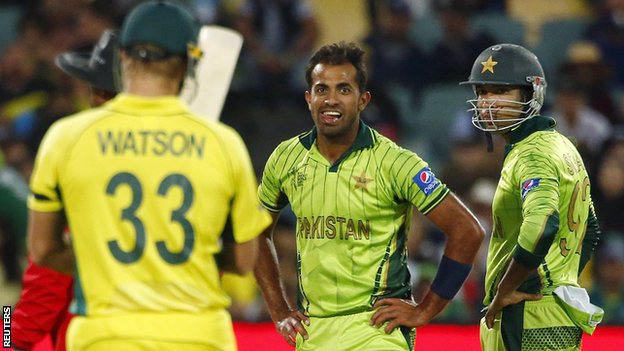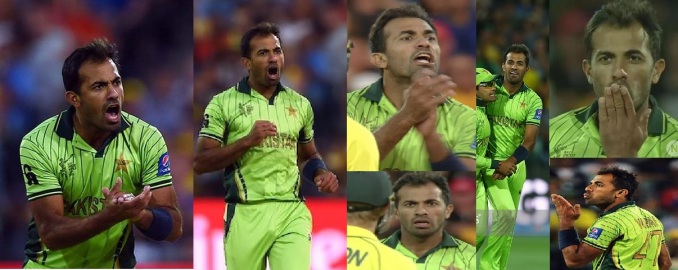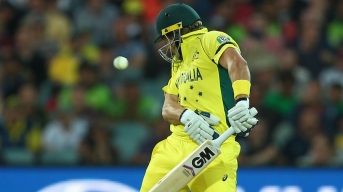Blog Archives
The Neural Connection with Wahab Riaz
Ever had an experience where you are not really there, but you are there? A moment stuck in time where in the thrill of witnessing what someone is doing, the ‘why’ of that performance is lost in between? Let me rephrase the question, have you ever had the experience of watching a Pakistani fast bowler attempt to defend a small total?
At the biggest stage, in front of a large hostile crowd cheering on the home side, and in a country which truly values devastating fast bowling, Wahab Riaz came up with a performance so animalistic in nature, the players watching it in the stadium, the 30,000 plus crowd present in the stadium, and the millions watching it on the television will remember it for years to come.
Wahab’s bowling was filled with such undisguised anger, it was a near miracle he didn’t lose control of his bowling or his temper, either through the 6 overs of his first spell nor in 2 of the 3 overs he bowled in his second spell. It was difficult to ascertain what Wahab was angrier about. His bowling seemed a direct response to both, his team’s run-of-the-mill insipid batting and the sledging from the Aussies who had hounded him every minute he was on the crease. Perhaps the Australians sensed that in the absence of Irfan, disarming Wahab was the key, and continued their tradition of going for the head of the snake. In that, they ended up complimenting him, perhaps inadvertently reaffirming Wahab of his status and value to the opposition. And oh how the head of the snake responded.
The first 8 overs were captivating yes, but one felt a slight uneasiness, inevitability even, as if the real showdown which was to come was expected. When would Misbah introduce Wahab? What could he do? The tension Wahab brought with himself was visible in Warner’s first shot, a mistimed punch off the back foot off a short and wide delivery that went for three runs. Another wild bouncer followed and was called a wide. And then Wahab struck, a short rising ball which Warner could not control, caught ironically in hindsight, by Rahat at third-man. Enters Michael Clarke. Wahab is touching 90 mph in his first over. A short-leg fielder comes up to say hello. The fourth ball of the second over is venomous, it is a cruise missile aimed at the narrow length between Clarke’s neck and the top of his head. Wahab cruelly choses to exploit Clarke’s weak back. Clarke could only fend off the ball to forward short-leg. And Wahab had burst the door open. Angry. Fast. And hungry for more.
Wahab that day was in complete sync with the most quintessential of human instincts; that of the hunter. Wahab’s rhythmic run up and delivery was hypnotizing. Your pulse raced with the rise and fall of his own. As a spectator on TV, you felt your emotions spilling over, blood boiling and body temperature rising a few degrees as the force of Wahab’s aura overwhelmed everything else. In that moment, you felt a part of your soul had formed a neural connection of sorts with Wahab and the full impact of his anger, frustration, aggression and desperation hit you like a freight train.
As Wahab sent in bouncer after bouncer and Watson hung on for dear life, as he hushed the vocal crowd who must have sensed a slight element of fear, as he was delightfully reminding Watson about the bat he had come out with and bullying him in his strong zone, he transcended the match result itself, the runs needed, and the other players on the field. You were moved by one man’s barely believable confidence in his own skill to challenge and dominate an opponent. The bouncers were of such high quality pace and accuracy, for a moment you’d have thought this was Bodyline in Adelaide 1932-33, Harold Larwood at the bowling crease and Douglas Jardine his captain. With two close-in catchers on the leg side, Misbah certainly did what was allowed. Judging by Wahab’s accuracy, in hindsight, he could probably have had all others come around the bat at catching positions and Watson still wouldn’t have been able to get him away. Among the many that were there to watch the spectacle, it seemed there were only two. Then and there, the world must have been a lonely place for Watson.


That Wahab couldn’t inflict more damage through the wickets column was due to fielding of such poor standards it should be termed criminal. Also, the resilience of Watson and Smith cannot be ignored. One can only imagine what would have become of the Pakistani batting unit had they faced such a ferocious spell of bowling. As Wahab returned for a second spell with the game almost lost, he gave Pakistan one more chance to make amends. Maxwell made an ugly attempt at a pull / swat that went high towards third man. Predictably, this attempt to catch the ball was even worse. Wahab, so visibly in anguish, let out another pained scream and the World Cup was over. The rest was just semantics, the last rites of one of those many ‘what-if’ games Pakistan has been a part of. Coach Waqar may consider putting an arm around Wahab, and let him know why he and Wasim only concentrated on LWBs and Bowleds.
With the chaotic management and injustice both prior to, and during the first 2 games of the World Cup, I had tried to disassociate myself from the team’s cricket, dispassionately declaring for a need to lose 0-6 in the group stages so that the disease which plagues Pakistan cricket does not remain covered. A friend asked me the day after the match that why was I so emotional about the result now, and I could only respond with a phrase fast becoming legend, courtesy of some very Pakistani cricket journalists and fans, “Kya karun yaar, Pace is Pace Yaar (What to do man, Pace is Pace man).”





What’s in Wasim and Ramiz?
Feb 25
Posted by Hamza
The 2 people who find it difficult to be Pakistani
What’s in Wasim Akram and Ramiz Raja?
No seriously, what’s so special these two Pakistani commentators that allows them to remain untainted from India’s recent efforts to humiliate every Pakistani on every political front?
To start with, there was, and still is, the brouhaha over Pakistan’s participation in the Indian Premier League (IPL).
The extension of T20 franchise system on a global level, in the form of Champions Trophy, was next. Last competition was the first time a Pakistani franchise ‘Sialkot Stallions’ was allowed to participate, and even that through a qualifier system which was wretchedly unfair.
There has been serious political protests and concerns over Pakistan’s cricket team visiting India, and it was only affected after considerable political humiliation of Pakistan.
For the Women’s World Cup, the women cricket team of Pakistan was relocated from Mumbai to Cuttack, after threats to the team. Moreover, they faced the humiliation not being allowed accomodation in hotels. The team was confined to the stadiums, which was utter humiliation in a global tournament.
To add more to the atrocities against our visiting teams in India, our blind cricket team captain was poisoned, after Pakistan had beat India in a group fixture.
And finally, India released all Pakistani hockey players that it had invited for the Hockey India League (HIL), after serious political protests and pressure.
Hence my question: What’s in Wasim and Ramiz? I have observed their commentary and how cosy they have become with Indian sports broadcasters. All of Pakistan have witnessed their incessant sucking up to other Indian commentators on the panel, the Indian cricket team and the Indian cricket board. One also wonders why these two are well accepted in Indian media circles when everything else associated with Pakistan is shunned by the Indian auathorities.
Ofcourse the cricketing community knows their commentary skills are mediocre at best. If it’s excellence in commentary they seek, they need not look farther than Waqar Younis, a genuinely good spokesman in every aspect. Are they accepted only because of their tendency to be dominated by Indian contemporaries in the media box? Are Wasim and Ramiz much needed up-shots to the Indian ego? Does their presence in the midst of Indian celebration of its nation’s greatness makes the celebration that much sweeter?
So why Wasim Akram and Ramiz Raja? And why have these two not made any effort to uphold some semblance of pride in their own nation’s position and its treatment at the hands of the Indian authorities? Sunil Gavaskar for instance, publicly communicated his displeasure at revival of Indo-Pak cricket ties when the perpetrators of Mumbai attack were still unpunished then. Surely there must come a time when an individual takes a stand? Unfortunately, for Wasim and Ramiz, The question is not ‘when‘, the question is ‘will it ever?‘
Posted in Cricket & Nothing But
2 Comments
Tags: ball, bat, bcci, Champions Trophy, commentary, cricket, fast bowler, HIL, hockey, india, IPL, pakistan, pcb, politics, ramiz raja, wasim, wasim akram